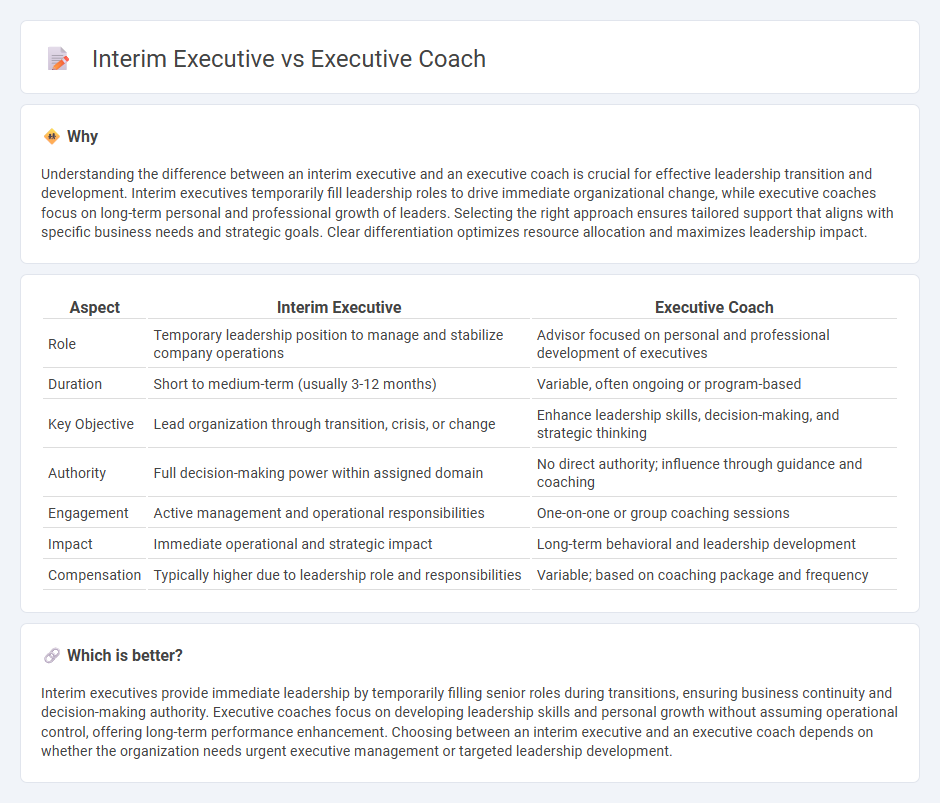
Interim executives provide temporary leadership during periods of transition or crisis, ensuring continuity and operational stability with a focus on immediate business results. Executive coaches specialize in personal and professional development, enhancing leadership skills, emotional intelligence, and strategic thinking over the long term. Discover how each role uniquely supports organizational growth and leadership excellence.
Why it is important
Understanding the difference between an interim executive and an executive coach is crucial for effective leadership transition and development. Interim executives temporarily fill leadership roles to drive immediate organizational change, while executive coaches focus on long-term personal and professional growth of leaders. Selecting the right approach ensures tailored support that aligns with specific business needs and strategic goals. Clear differentiation optimizes resource allocation and maximizes leadership impact.
Comparison Table
| Aspect | Interim Executive | Executive Coach |
|---|---|---|
| Role | Temporary leadership position to manage and stabilize company operations | Advisor focused on personal and professional development of executives |
| Duration | Short to medium-term (usually 3-12 months) | Variable, often ongoing or program-based |
| Key Objective | Lead organization through transition, crisis, or change | Enhance leadership skills, decision-making, and strategic thinking |
| Authority | Full decision-making power within assigned domain | No direct authority; influence through guidance and coaching |
| Engagement | Active management and operational responsibilities | One-on-one or group coaching sessions |
| Impact | Immediate operational and strategic impact | Long-term behavioral and leadership development |
| Compensation | Typically higher due to leadership role and responsibilities | Variable; based on coaching package and frequency |
Which is better?
Interim executives provide immediate leadership by temporarily filling senior roles during transitions, ensuring business continuity and decision-making authority. Executive coaches focus on developing leadership skills and personal growth without assuming operational control, offering long-term performance enhancement. Choosing between an interim executive and an executive coach depends on whether the organization needs urgent executive management or targeted leadership development.
Connection
Interim executives and executive coaches both play crucial roles in enhancing organizational leadership and performance during transitional periods. Interim executives temporarily fill leadership gaps, driving strategic initiatives and stabilizing operations, while executive coaches provide personalized guidance to develop leadership skills and improve decision-making effectiveness. Their combined impact accelerates organizational growth by blending hands-on management with targeted leadership development.
Key Terms
Leadership Development (executive coach)
Executive coaches specialize in leadership development by providing personalized guidance to enhance an executive's skills, decision-making, and emotional intelligence, enabling sustained organizational growth. Unlike interim executives who temporarily fill leadership roles to manage operations and maintain business continuity, executive coaches focus on long-term professional growth and behavioral change. Discover how partnering with an executive coach can transform leadership potential into measurable success.
Change Management (interim executive)
Interim executives specialize in leading complex change management initiatives by providing strategic direction and stabilizing organizations during transitions, leveraging their deep industry expertise and adaptive leadership skills. Executive coaches, on the other hand, focus on developing leaders' personal and professional growth to enhance their performance over the long term. Explore more to understand how interim executives drive transformational change effectively.
Performance Improvement
An executive coach specializes in enhancing leadership skills and driving sustainable performance improvement through personalized development plans and ongoing support. An interim executive temporarily fills leadership roles, delivering immediate strategic and operational improvements during transitions or crises. Explore more insights on how executive coaching and interim leadership can optimize your organization's performance.
Source and External Links
Executive Coaching Services for Leadership Growth - Korn Ferry offers executive coaching services to help leaders grow by providing a supportive environment for self-reflection and skill development.
Your Guide To Hiring an Executive Coach - Indeed provides a guide on hiring an executive coach, highlighting reasons such as career growth and improving leadership skills.
Bay Area Executive Coach - Offers executive coaching services to help professionals achieve their goals through leadership skills development in areas like advancement, communication, and emotional intelligence.
 dowidth.com
dowidth.com